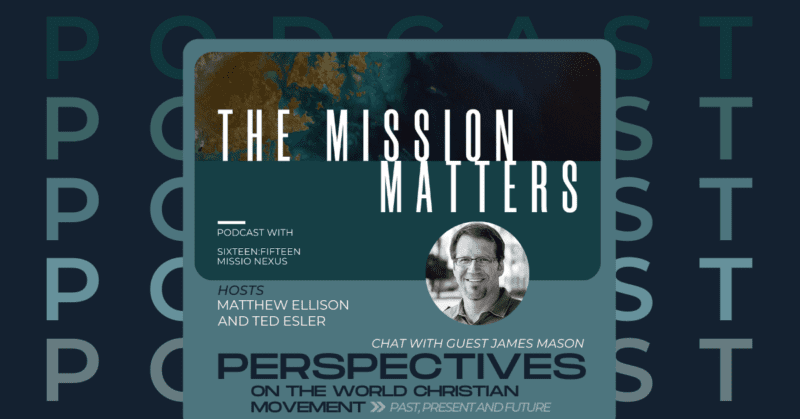What is Missiology?

By Marvin J. Newell, General Editor, Evangelical Missions Quarterly

A few years ago, I was checking in at an airline counter for an overseas flight. When the attendant noticed the prefix “Dr.” on my name, she asked in what field was I a doctor (many times airlines like to know if there is a physician onboard). I told her I was a doctor of missiology. With a puzzled look she asked what a doctor in missiology was. Without thinking I glibly said that it had to do with the science of missiles. But then catching myself I told her I was only joking, and that missiology related to the study of Christian missions. She was just as puzzled with my second answer as the first.
Although we don’t expect non-believers to have an inkling about the discipline of missiology, there are many within Christian circles that are clueless as well. Sadly, even some who are engaged in Christian missions are confused as to the value of missiology. Let’s bring clarification to its meaning.
Missiology Defined
Simply put, missiology is the reflective discipline that undergirds and guides the Church’s propagation endeavors as it advances the knowledge of the gospel in all its fullness to every people, everywhere.
Direction and Protection
Missiology functions much like the rudder of a ship that provides direction to the vessel as it passes through the water. Just as a ship undertakes to maintain a true course as it navigates through both calm and turbulent seas, missiology keeps the outreach of the church on course as its ambassadors expend themselves to “make disciples of all nations” (Mat. 28:19).
Besides direction, there is a parallel function to missiology. Missiology also gives protection. It serves as a firewall to the Church on mission, protecting it from detrimental influences that would dilute or even destroy its effectiveness in outreach to the world. As many know, in the world of computers a firewall is a security system that monitors and controls incoming and outgoing traffic. It is a barrier guarding between a desired trusted network and an unwanted, untrusted, harmful network.
Accordingly, one of the tasks of missiologists is to evaluate contemporary trends, ideas, issues, and influences to determine if they align with the biblical mission entrusted to the Church. Some of these ideas and influences are internal. Others are external and often a threat. Both need to be professionally critiqued and some need to be challenged. That becomes the task of informed persons – the missiologists.
Missiology Described
The following are core explanations that fall within the purview of missiology.
1. Missiology is first and foremost based on Scripture.
Missions is a biblical task and therefore missiologists need to be biblically informed. A thorough knowledge of the Word of God is essential. The message we propagate is derived from the changeless Word of God. A primary task of missiology is to know God’s word and keep what we proclaim clear and uncompromised.
Scripture also gives direction to how the proclamation of the Gospel is accomplished. It is an unfailing guide as missionaries go about their varied assignments, with missiology functioning to keep God’s messengers on track biblically. Both our core message and our overall methodology are to be based on the Bible because the missionary task is a biblical task.
2. Missiology is multidisciplinary.
It is multi or interdisciplinary in nature, weaving together a biblical foundation that is augmented with many of the social sciences: anthropology, sociology, and a broad range of subjects found in the disciplines of intercultural studies (linguistics, world religions, communications, etc.). However, those disciplines are imperfect and should never take precedence over the teaching of Scripture that unerringly informs us how to engage the world.
3. Missiology is both reflective and practical.
Although it is comprised of both, missiology is not just theoretical and theological. Missiologists study mission-related issues, reflecting on their relevance and influence on the Church’s mission, comparing what the tenor of Scripture has to say, and then striving to make practical application to the mission movement. This is where the twin responsibilities of direction and protection are applied.
4. Missiology balances missionary zeal with prudence and discretion.
“It is not good to have zeal without knowledge, nor to be hasty and miss the way.” (Proverbs 19:2 NIV). Missiology brings balance to zeal and a taming to wasteful haste in mission activity. Reflective thinking interjects prudence and discretion into zealous outreach.
5. The focus of missiology is on the outward motion of being sent, going, and being senders.
David J. Bosch succinctly observed, “The term mission presupposes a sender, a person sent by the sender, those to whom one is sent, and an assignment.”[1] It is all about being sent, going and taking a message somewhere, usually in an official capacity. It was Jesus himself who authorized the sending: “As the Father has sent me, so send I you.” (John 20: 21).
6. Missiology critiques mission-related trends and issues.
Not one trend or new idea should get a free pass into mission praxis. Every novel idea, every new trend, and every proposed methodology needs to be vetted through missiological evaluation, analyses, and assessment. Peer reviews along with journal and blog exposure helps to refine, correct, and even expand mission advance. As iron sharpens iron, so missiological thinking sharpens mission practice.
7. Missiology demands that missiologists travel.
By its very nature, the field of missiology necessitates engagement with the world and those reaching the lost. Missiologists need to personally engage the global environment they write and teach about. Unlike other academic disciplines that can be undertaken from the convenience of an office or campus, informed missiologists travel the world to see first-hand what they speak, write and teach about. Respected missiologists are more than armchair experts.
Missiology remains vital to the Church and will be required
as long as the Church is on mission. New generations of missiologists will
always be needed to direct and protect the Church to align with the biblical
mission entrusted to it.
[1] Bosch, David J. Transforming Mission: Paradigm Shifts in Theology of Mission. (Maryknoll, New York: Orbis Books, 1991), 1–2.





